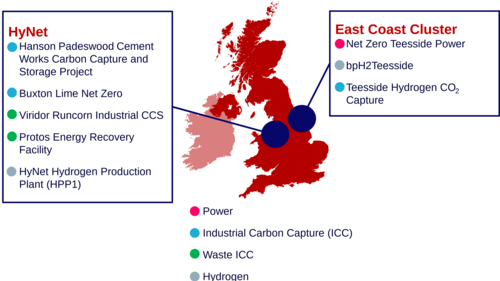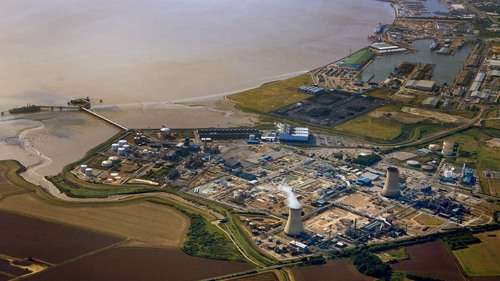New vision to create competitive carbon capture market follows unprecedented £20 billion investment in the United Kingdom
- CCUS Vision sets out plans for new competitive market in Carbon Capture, Usage and Storage (CCUS) by 2035 – to unlock investment and drive economic growth, adding £5 billion to the economy by 2050
- long-term decisions to achieve this include outlining a timeline to establish a new CCUS market and using competition to drive lower costs for industry
- potential to store the carbon equivalent of taking 6 million cars off the road – and support 50,000 jobs by 2030
- Green boost for the UK economy as Energy Secretary sets out plan to make the UK a global market for Carbon Capture, Usage and Storage.
The plan – named the CCUS Vision – sets out how the UK will transition from early projects backed by government support to becoming a competitive market in this area by 2035, meaning UK companies will compete to build carbon capture facilities and sell their services to the world.
This is expected to boost the economy by £5 billion a year by 2050 – making the UK a pioneer in this technology while meeting its net zero commitments in a reasonable way that eases the financial burden on taxpayers.
Carbon capture works by capturing carbon dioxide (CO2) before it reaches the atmosphere and storing it safely underground – filling the spaces left by oil and gas extraction. The UK holds a strategic advantage compared to other countries thanks to its unique geology, skills and infrastructure as an island nation. It also offers enough space under the North Sea for up to 78 billion tonnes of CO2.
This is the latest step to develop CCUS technologies - which aim to store 20-30 million tonnes of CO2 per year by 2030 and support 50,000 jobs by 2030 - backed by up to £20 billion of investment.
It comes as the Department launches the process for more companies to connect to and expand the HyNet Cluster in the North-West and Wales – delivering further jobs and investment in the region.
Energy Security Secretary Claire Coutinho said: Thanks to the UK’s geology, skills and infrastructure, we are in a unique position to lead the way on carbon capture technologies.
That is why we’re making one of the biggest funding commitments in Europe on carbon capture that will cut emissions from our atmosphere, while unlocking investment, creating tens of thousands of jobs and growing the UK economy.
Energy Efficiency and Green Finance Minister Lord Callanan said: We need pragmatic answers to the carbon challenge, and with our infrastructure, skills and geology, the UK is in pole position to take advantage of game-changing carbon capture and storage technology. Today we’re publishing a blueprint to deliver a world-leading UK carbon capture industry, so that we have a competitive market in this exciting new technology by the middle of the next decade. Backed by an unprecedented £20 billion investment, this is also a pivotal milestone in our journey to net zero that will drive economic growth, unlock investment and create tens of thousands of jobs in our industrial heartlands.
Ruth Herbert, CEO, Carbon Capture and Storage Association said:We welcome the CCUS Vision published today, setting out a long-term strategy for the UK’s CCUS industry to be able to store over 50Mt a year by 2035 to support the decarbonisation of domestic industries and take advantage of export opportunities.
It is great to see CO2 transport by ship, road and rail will be enabled from 2025 onwards, which will also support longer-term cross-border CO2 transport solutions.
Hedvig Ljungerud, NSTA Director of Strategy, said: The energy transition and the path to net zero cannot succeed without carbon storage. As the regulator, we welcome today’s announcement and look forward to supporting this growing industry as it benefits the UK’s economy and the fight against climate change.
The CCUS Vision – the plan to create a competitive CCUS market by 2035 – includes measures to achieve this goal, including:
- moving to a competitive allocation process for carbon capture projects from 2027 to speed up the building of the UK’s CCUS sector
- creating the conditions for projects that cannot transport CO2 by pipeline to enter the market from 2025 onwards, using other forms of transport such as ship, road and rail
establishing a working group led by industry to identify and adopt solutions to reduce the cost of capturing CO2 - Earlier this year, a further 2 carbon capture clusters were announced, bringing the total to four UK carbon capture clusters to support the government’s ambition to decarbonise industry and power – HyNet in North West England, East Coast Cluster in Teesside and the Humber, Acorn in Scotland and Viking in the Humber.
These will build truly integrated energy hubs that make the best use of the UK’s established infrastructure, and play a key role in the country’s measured, pragmatic approach to reaching net zero.
The UK government has also today announced significant progress in delivering on these carbon capture clusters in the UK’s industrial heartlands. This includes:
agreeing initial commercial terms with the Northern Endurance Partnership (NEP) around Teesside and the Humber, paving the way for expansion of that cluster. The government will now consider the best time to launch an expansion process from 2024 based on an assessment of store readiness in the New Year and, having announced the locations of the third and fourth CCUS clusters in the Summer, government is today announcing a faster process to get those clusters set up and suitable capture projects identified
Luciano Vasques, Managing Director, Eni UK said:We see strong demand from businesses across the UK for CCS so today’s announcement is a welcome step forward. We look forward to providing transportation and storage at HyNet for a wider range of companies in North West England and North Wales, helping them to reduce CO2 emissions, protect local jobs and boosting industrial competitiveness for the region.
Chris Daykin, General Manager, NEP said:Today’s announcements mark another positive milestone in the development of the East Coast Cluster and the UK CCUS industry.
Agreeing the key commercial principles through the Heads of Terms is a crucial step in the decarbonisation of the North East region and delivering jobs. We look forward to the expansion process launching from 2024 and agree that the selection of projects by HMG should be matched to the available transportation and storage capacity, so that projects and stores are developed at the same pace and equivalent level of maturity.
We thank the UK government for their continued support as we work to complete the final agreements in the coming months, enabling NEP to take Final Investment Decision in September 2024.
Latest news
INEOS launches €250m investment supported by the French Government to secure the future of French industry at Lavera
The project marks the first phase of a long-term regeneration plan to reduce emissions, boost reliability, efficiency and competitiveness, with support of the French State.
Hycamite’s technology to decarbonize shipping awarded AiP by industry leader DNV
Kokkola Industrial Park →Hycamite’s proprietary Thermo-Catalytic Decomposition (TCD) technology offers a new approach to producing clean hydrogen by breaking down methane, the primary component of liquefied natural gas (LN...
Clariant catalysts will power the Ecoplanta: Europe's first waste-to-methanol plant
Chemmed Cluster Tarragona →Repsol is building Europe’s first plant to produce renewable methanol from urban waste The facility will use Enerkem gasification technology to produce 240 KTA of methanol Clariant will supply cata...
Lilly plans to build a new $3 billion facility to boost oral medicine manufacturing capacity in Europe for patients worldwide
Netherlands site will bring 500 manufacturing and 1,500 construction jobs while further strengthening Lilly's global supply chain

